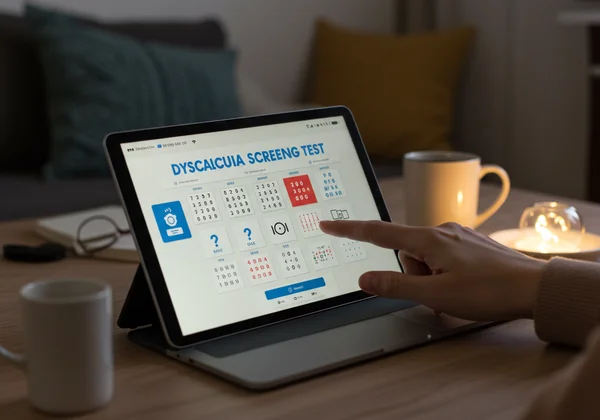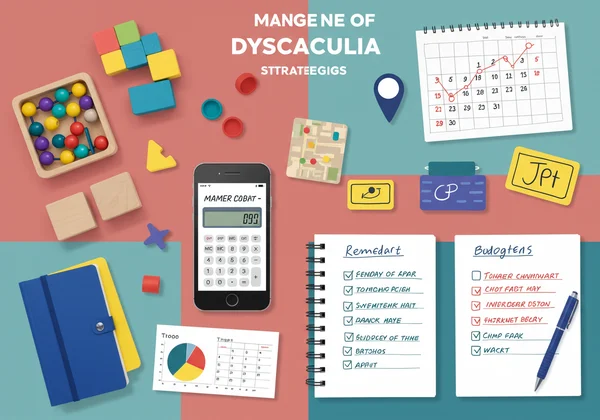Free Dyscalculia Test & Screening Guide: Symptoms, Support, and Clarity
October 11, 2025 | By Aisha Bennett
Staring at a page of numbers can feel like trying to read a foreign language for some. Simple tasks like calculating a tip, managing a budget, or helping a child with math homework can trigger intense anxiety and frustration. If this sounds familiar, you're not alone, and it's not about being "bad at math." Have you ever wondered if your struggles with math are more than just a lack of practice? This comprehensive guide will explore dyscalculia, a specific learning difference that affects a person's ability to understand and work with numbers. We'll uncover its symptoms, explain the path to clarity through screening, and offer empowering support strategies. Your journey to understanding begins now.
What is Dyscalculia? Understanding This Math Learning Difference
Dyscalculia is a specific and persistent difficulty in understanding numbers, which can affect a wide range of mathematical skills. It's often described as "math dyslexia." This learning difference is neurological in origin, meaning it stems from the brain's structure and function. It is not a reflection of a person's intelligence or effort. Individuals with dyscalculia may struggle to grasp fundamental number concepts, lack an intuitive sense of quantity, and have trouble learning facts and procedures for mathematical calculations. Understanding that this is a recognized condition is the first step toward finding effective solutions and building confidence.

Dyscalculia vs. Math Anxiety: Distinguishing the Challenges
It's crucial to differentiate between dyscalculia and math anxiety, though they often coexist. Math anxiety is an emotional response—a feeling of tension, apprehension, or fear that interferes with math performance. Dyscalculia, on the other hand, is a cognitive difficulty with processing numerical information. A person can have math anxiety without having dyscalculia. However, the persistent struggles caused by dyscalculia can certainly lead to significant math anxiety. Recognizing the root cause is key; while emotional support can ease anxiety, distinguishing the challenges helps identify if underlying cognitive differences need specific, targeted learning strategies.
The Cognitive Roots: How Dyscalculia Affects Brain Function
Research suggests that dyscalculia is linked to how the brain processes numerical information. The core issue often lies in a deficit in "number sense," the intuitive ability to understand and compare quantities. For example, quickly knowing that 8 is more than 5 without counting. This difficulty can be traced to differences in the parietal lobe, a region of the brain vital for numerical and spatial processing. This impacts working memory for holding numbers, visual-spatial skills for aligning columns, and the ability to connect abstract number symbols to the real-world quantities they represent. Understanding this brain function helps demystify the struggle—it’s not a choice, but a different way of processing the world.
Identifying the Signs: Dyscalculia Symptoms Across Different Ages
The signs of dyscalculia can manifest differently throughout a person's life. What appears as a difficulty with counting in a young child can evolve into challenges with budgeting or time management in an adult. Recognizing these signs is the first step toward getting the right support. By being aware of the symptoms at each stage, parents, educators, and adults themselves can take proactive steps toward understanding and intervention. For many, simply putting a name to their lifelong struggles can be a profoundly validating experience.
Early Indicators: Recognising Dyscalculia in Children & Teenagers
In school-aged children and teenagers, the signs of dyscalculia are often most visible in their academic performance and attitude toward math. A child isn't just "acting out" or "being lazy" when they resist math homework; they may be experiencing genuine cognitive difficulty. Recognising dyscalculia early can prevent years of frustration and damage to self-esteem.
Common signs in children and teens include:
-
Difficulty learning to count and associating numbers with amounts.
-
Trouble recognizing number patterns, like "greater than" or "less than."
-
Reliance on finger counting long after peers have stopped.
-
Struggles with recalling basic math facts, such as times tables.
-
Anxiety about math classes or number-related games.
-
Difficulty with word problems and understanding the steps required to solve them.
-
Trouble with time concepts, like telling time on an analog clock or estimating how long a task will take.

Hidden Struggles: Dyscalculia Symptoms in Adults
For many adults, dyscalculia has been a hidden struggle they've carried for years, often masking it with coping mechanisms or avoiding number-heavy tasks altogether. They may have been labeled as "not a math person" and accepted it without realizing there was an underlying reason. Identifying dyscalculia symptoms in adults can open the door to self-acceptance and practical strategies that make daily life easier. If you see yourself in these signs, an online dyscalculia test can be an empowering next step.
Common signs in adults include:
- Intense anxiety when faced with tasks like splitting a bill or calculating a tip.
- Difficulty managing personal finances, budgeting, or understanding bank statements.
- Trouble remembering numerical information like phone numbers, ZIP codes, or dates.
- Frequently running late due to an inability to estimate travel time accurately.
- Challenges with tasks that require measurement, like cooking or home improvement projects.
- A tendency to get lost easily, struggling with directions and spatial orientation.
Your Path to Clarity: Dyscalculia Screening and Assessment Options
If you suspect that you or a loved one might have dyscalculia, the next question is clear: what can you do about it? The journey to clarity begins with screening. A screening is not a formal diagnosis but an invaluable first step to identify potential signs and determine if further evaluation is needed. It provides data-driven insights that can replace confusion and self-doubt with understanding and a clear direction forward. This process is about empowerment, giving you the information needed to seek the right kind of support.
The Value of Online Screening: Accessible First Steps to Understanding
In today's digital world, gaining initial insights has never been easier. An online dyscalculia screening is one of the most accessible first steps you can take. It allows you to explore your mathematical processing skills from the comfort and privacy of your own home. Our platform provides a professional, expert-designed free dyscalculia screening that helps identify signs of number-related challenges. It removes barriers like cost and scheduling, making it a powerful tool for concerned parents, questioning adults, and proactive educators who need a reliable starting point.

Beyond Scores: What to Expect from a Comprehensive Report
A simple score can tell you if you have signs of dyscalculia, but it doesn't tell you what to do next. That’s where a comprehensive report makes all the difference. After completing our initial screening, you have the option to receive a personalized, AI-driven analysis. This report goes beyond a basic result to provide a detailed cognitive profile. It highlights your unique strengths and challenges, explains how these traits may impact daily life, and offers tailored strategies and tools to help you succeed. This in-depth feedback transforms the screening from a simple test into a personalized roadmap for growth. Start your journey to understanding today.
Empowering Strategies & Practical Support for Dyscalculia
Identifying dyscalculia is just the beginning. The truly transformative part of the journey is discovering and implementing strategies that work with, not against, your unique cognitive profile. Empowerment comes from knowing that challenges can be managed with the right tools and techniques. Whether for a student in the classroom, an adult navigating their career, or a parent supporting their child at home, practical support is available. The goal is not to "cure" dyscalculia but to build skills, confidence, and resilience.

Effective Learning Techniques for Students and Educators
For students with dyscalculia, traditional math instruction can often feel overwhelming. A multi-sensory approach is one of the most effective learning techniques. This involves using sight, touch, and movement to make abstract concepts concrete.
- Use Manipulatives: Objects like blocks, beads, or even LEGOs can help visualize number problems.
- Embrace Technology: Many apps and software programs offer engaging, game-based learning to practice math facts without the pressure of timed tests.
- Focus on Real-World Math: Connect concepts to everyday situations, such as cooking, shopping, or sports statistics, to make them more relevant and understandable.
- Allow Ample Time: Remove the pressure of timed drills, which can exacerbate anxiety and shut down working memory.
Daily Life Hacks: Managing Dyscalculia in Adulthood
Adults with dyscalculia can leverage technology and simple organizational strategies to navigate daily challenges with greater ease. The key is to create systems that reduce the cognitive load of number-related tasks. Managing dyscalculia is about working smarter, not harder.
- Utilize Your Smartphone: Use the calculator for everything from tipping to budgeting. Set multiple alarms and calendar reminders to manage time effectively.
- Visualize Finances: Use apps that create charts and graphs to track spending instead of trying to decipher spreadsheets of numbers.
- GPS is Your Friend: Rely on GPS apps for navigation to ease spatial orientation challenges.
- Write Everything Down: Create checklists and write down important numbers in a dedicated notebook or app to support working memory.
Navigating the world of numbers with dyscalculia can be challenging, but it is a journey you don't have to take alone. From understanding its cognitive roots to identifying symptoms across all ages and implementing practical support strategies, knowledge is the first and most powerful tool. Dyscalculia is not a barrier to success; it is simply a different way of thinking that requires a different approach.
Your path to greater confidence and clarity starts with a single step. We invite you to take the free test on our homepage. This expert-designed screening is your confidential first step toward understanding your unique cognitive profile. Gain the insights you need to turn challenges into strengths and unlock your full potential.
Frequently Asked Questions About Dyscalculia & Screening
How do I know if I have dyscalculia or am just bad at math?
Many people feel they are "bad at math," but this often stems from anxiety or inadequate instruction. Dyscalculia is different. It's a persistent, deep-seated difficulty with fundamental number concepts, like understanding quantity or recalling basic math facts, that doesn't improve with typical practice. If your struggles are long-term, impact multiple areas of your life, and cause significant distress, it may be more than just a simple dislike for math.
What are the primary signs of dyscalculia in children and adults?
In children, primary signs include difficulty learning to count, recognizing numbers, and a heavy reliance on finger counting. In adults, it often appears as significant trouble with everyday tasks like budgeting, managing time, calculating tips, or remembering sequences of numbers like phone numbers. A core theme across all ages is a weak "number sense" and high anxiety around mathematical tasks.
Is there a reliable online test for dyscalculia?
Yes, there are reliable online screening tools designed to identify the signs of dyscalculia. While these tools cannot provide a formal medical diagnosis, they are an excellent first step. The dyscalculia screening is a robust tool developed by educational psychologists and math experts to provide a trustworthy initial assessment. It helps you understand if your challenges align with the common profile of dyscalculia.
What should I do after taking a dyscalculia screening test?
After taking a screening test, take time to review your results. If you opt for our AI-powered report, explore the personalized strategies and insights provided. These can offer immediate, actionable steps. If the results indicate a high likelihood of dyscalculia, you might consider sharing them with an educator, therapist, or medical professional to discuss pathways for a formal diagnosis and more comprehensive support plans.